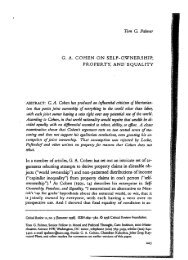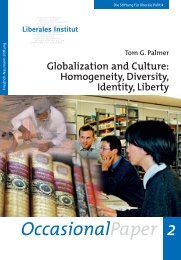Are Patents and Copyrights Morally Justified? - Tom G. Palmer
Are Patents and Copyrights Morally Justified? - Tom G. Palmer
Are Patents and Copyrights Morally Justified? - Tom G. Palmer
Create successful ePaper yourself
Turn your PDF publications into a flip-book with our unique Google optimized e-Paper software.
832 HarvardJournal of Law & Public Policy [Vol. 13<br />
one’s body, the violation of which constitutes an infringement<br />
of liberty. (2)<br />
[God] gave [the earth] to the Industrious <strong>and</strong> Rational, (<strong>and</strong><br />
Labour was to be his Title to it;) not to the Fancy or Covetousness<br />
of the Quarrelsom <strong>and</strong> Contentious. He that had<br />
as good left for his Improvement, as was already taken up,<br />
needed not complain, ought not to meddle with what was<br />
already improved by another’s Labour: If he did, ‘tis plain he<br />
desired the benefit of another’s Pains, which he had no right<br />
to.... 54<br />
(3)” ‘tis Labour indeed that puts the difference of value on<br />
everything. . . . [T]he improvement of labour makes the far<br />
greater part of the value.” Indeed, “in most of them 99/100 are<br />
wholly to be put on the account of labor.” 55<br />
These three arguments all lend support, each in a different<br />
way, to private property rights in l<strong>and</strong>—Locke’s primary interest<br />
in the chapter on property. They diverge when it comes to<br />
ideal objects, however. Although the second <strong>and</strong> third arguments<br />
lend support to intellectual property rights claims, the<br />
first emphatically does not. For Locke, self-ownership serves<br />
several important functions. First, it is the foundation of liberty;<br />
indeed, it is synonymous with liberty. Second, it allows<br />
Locke to respond effectively to Filmer’s criticism of the consent<br />
theories of property set forth by Grotius <strong>and</strong> Pufendorf. If appropriation<br />
of common property rests on unanimous consent,<br />
Filmer knows of at least one person who would refuse his consent,<br />
thus knocking the struts out from under the entire edifice.<br />
Locke seeks to show “how Men might come to have a property<br />
in several parts of that which God gave to Mankind in common,<br />
<strong>and</strong> that without any express Compact of all the Commoners,”<br />
56 that is, in a way that will avoid Filmer’s otherwise fatal<br />
objection. By beginning with one tangible thing that is so<br />
clearly one’s own that no one else can claim it—one’s own<br />
body—Locke can show how property rights can legitimately<br />
emerge without requiring universal consent, thus sidestepping<br />
Filmer’s objection. 57<br />
54. Id. at 333.<br />
55. Id. at 338.<br />
56. Id. at 327.<br />
57. Though the Earth <strong>and</strong> all inferior Creatures be common to all Men, yet<br />
every Man has a Property in his own Person. This no Body has any Right to<br />
but himself. TheLabourof his Body, <strong>and</strong> the Work of his H<strong>and</strong>s, we may say,<br />
are properly his.











